-
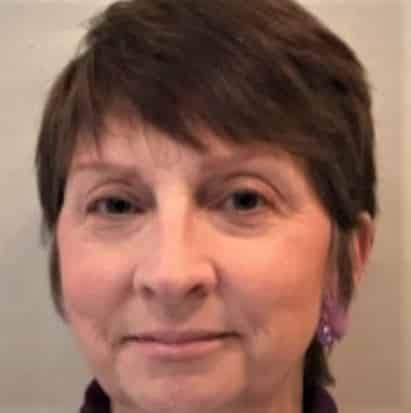
Time, Talents, and Treasures
“We Need to Help Each Other”
Investor Spotlight: Marcia Hansen
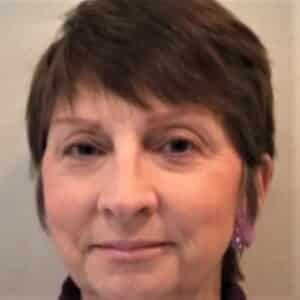
Marcia was introduced to Recovery Beyond by a friend and colleague four years ago. She was asked to serve on the board and after witnessing the founder’s passion for the cause to prevent homelessness through combating substance use disorder (SUD) she accepted the invitation and began her initial investment in our organization by giving her time.
Marcia knows firsthand what SUD can do to a person – two years ago a dear family friend lost a long battle with substance use to an overdose. Through serving on the board, Marcia was able to utilize her talents of organizational development to further grow Recovery Beyond and expand the programs that it offered to those afflicted by SUD. After two years the organization began to flourish and demonstrate a remarkable success rate for the program’s participants: For two years in a row 85% of those who completed the program were still sober after one year and 100% of the participants who took a leadership role were still sober at the end of the 2nd year.
With success rates like these, Marcia believed that Recovery Beyond had discovered a formula to successfully manage Substance Use Disorder and she jumped all in to spread the word about Recovery Beyond by not only giving her time and talents but also her treasures. Look for these treasures at the silent auction at the upcoming Rise Up celebration at Marymoor Park’s Velodrome field on August 29th from 1-4pm.
Thank you, Marcia, for everything you do and give. It is an honor to have a partner like you aiding in our mission to prevent homelessness and loss of life through our battle against substance use disorder.
-

Acupuncture for Recovery
Acupuncture for Recovery

For those unfamiliar with the practice of Traditional Chinese Medicine and Acupuncture, acupuncture uses hair-thin needles to penetrate energy points along energetic meridians within the body to treat a variety of health issues. This type of medicine views the body holistically and strives to find an energetic balance and flow through our minds, bodies, and spirits. Acupuncture needles are quite small, bendable, and honestly, not much of anything to write home about. It’s a wonder they can evoke the magic they do given their size and flimsiness.
As I pulled into the Enso Center (https://ensocenter.org/) in Redmond, WA, I was immediately taken by the two buildings and the serene feeling I got while on the property. The building to the left was a large, two-story building with an enormous outdoor patio. The building to the right was a beautiful home with a sign for an acupuncture clinic, Mix Acupuncture and Wellness. Trees aligned the property and a trail lead its way from the park across the street up into the woods behind the buildings. I was going to meet Sharon, a licensed acupuncturist of five years, to talk about the community acupuncture clinic she is graciously offering to Recovery Beyond, and to learn more about how acupuncture can help treat addiction. I was also curious to see the Enso Center itself, as they are generously offering several classes to Recovery Beyond program participants and volunteers.
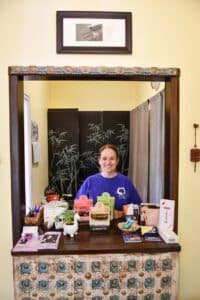 Sharon has been a licensed acupuncturist for the past five years. A graduate of the Seattle Institute of East Asian Medicine, she completed an internship at a methadone clinic in Seattle where she performed community acupuncture for those struggling with addiction (check out NADA – National Acupuncture Detoxification Association https://acudetox.com/). She and her husband, Jason, also went to Guatemala to offer health treatments to a community there, and both reveled at the power of acupuncture treatment on diabetics within this community. It gave me chills to listen to them talk about how, within a little over a week, they were able to observe blood sugar levels drop to healthy levels in diabetics using acupuncture.
Sharon has been a licensed acupuncturist for the past five years. A graduate of the Seattle Institute of East Asian Medicine, she completed an internship at a methadone clinic in Seattle where she performed community acupuncture for those struggling with addiction (check out NADA – National Acupuncture Detoxification Association https://acudetox.com/). She and her husband, Jason, also went to Guatemala to offer health treatments to a community there, and both reveled at the power of acupuncture treatment on diabetics within this community. It gave me chills to listen to them talk about how, within a little over a week, they were able to observe blood sugar levels drop to healthy levels in diabetics using acupuncture.Sharon and Jason own the Enso Center. They both exude a comforting, calm, aligned energy. Jason has been practicing martial arts for over 30 years now and offers a variety of classes at the center, from Qigong to Taekwondo to Archery. Sharon runs her acupuncture practice out of their home and her clinic promotes healing through it’s warm, inviting, and calm ambiance and her expertise. They kindly offered me a tour of the clinic and the center and let me try out these beautiful, ornate, antique vibrating bowls filled with water that stimulate the parasympathetic nervous system when you rub their handles (if you go, you must try these. I like a challenge and getting the bowls to vibrate was much harder than it looked.)
Why acupuncture for treating addiction, you might ask? It’s a complex explanation, but in essence, acupuncture treats all three parts of the person: the mind, body, and spirit. Addiction overpowers and consumes all three of these areas. Acupuncture lessens the intensity of the effects of detoxification on the body and stimulates the nervous system. It also releases energy blockages and nourishes energy deficient areas.
For those with addiction, Sharon recommends coming for a treatment either once a week or once every two weeks. She needles points in the ear to help treat addiction. The ear is considered to be a microcosm of the body; hence it can be used to treat the whole body. The treatment lasts about 30-45 minutes and is done in a community setting, where several others are together in a room also receiving a treatment. The community setting allows for people to heal together. While the needles are hair-thin, some people still prefer to have a needle-less treatment, which is absolutely a possibility. There are several options for this including acupressure (pressure applied to the points), beads (tiny stickers with metal beads that are attached over the points), tuina (massage of the points), cupping (cups applied to points where the skin is suctioned into the cup), and gua sha (gently scraping along the skin).
I highly recommend giving acupuncture a chance. The first community acupuncture clinic will be offered at the end of August. Check out Recovery Beyond’s calendar of events to register. You may hate it, but you might also love it. As Sharon shared with me, people feel relaxed afterward and it’s amazing to see people find a way back to their bodies again.

Acupuncture is not for everyone, but many do find relief from the practice. Always make sure to consult with your doctor prior to receiving a treatment and do not disregard professional medical advice or treatment before undertaking a new healthcare regimen or delay seeking medical advice because of something you have read in this article. Recovery Beyond is sharing this piece for informational purposes only, and none of this information is meant to be a substitute for professional medical advice, diagnosis, or treatment. Recovery Beyond does not provide medical advice.
-
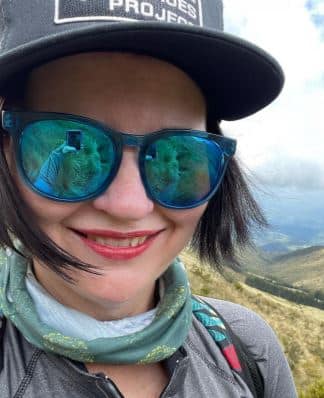
Becky Vinson: Service Gives Life
Becky Vinson’s military background was obvious as she led the latest Recovery Beyond climb team up Mt. St. Helens. She is comfortable dishing out orders and there isn’t a hint of compromise in her voice.
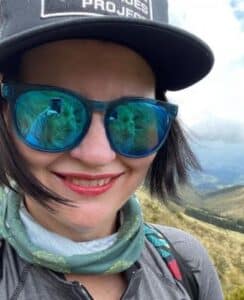
“Put on your packs. Break time is over.”
“We gotta pick up the pace.”
But there is more to Becky than toughness. Positivity and a can-do spirit radiate from every pore. It’s impossible not to love her. She is a force of goodwill.
Becky got involved with Recovery Beyond back in 2016 when she was providing veterans’ services at the Tacoma Rescue Mission. She was invited to become a volunteer on Recovery Beyond’s climb team. Now she also serves on the Recovery Beyond Advisory Team.
“I have no idea why I thought climbing Rainier would be easy,” she laughs. “I WAY underestimated it. I was the slowest one in the group. I had never done any serious hiking. My job was to boost everyone else’s self-esteem by always being dead last. But somehow I made it up.”
From her years in the Navy, Becky suffers with PTSD. As she climbed, she discovered something that surprised her.
“The rhythm of climbing became a tool to work out my anxiety. I was actually shocked at the mental health benefits. The pace is regular, like a metronome. Everything syncs to that pace. I don’t know how it works. It was an accidental discovery. But the more I hike and climb the more I understand that it is important to do activities that are strenuous. Climbing is grueling. But as I take each step, I work out the stuff inside. I’ve talked with lots of others about this and they all say the same thing.”

Spotting Becky sitting behind a desk is unlikely. Instead, you’ll find her with a backpack slung over her shoulder, making her way to the homes of veterans of WW2, the Korean War, and Vietnam. “Many of them are homebound due to war injuries and other significant chronic illnesses. I even manage people on ventilators. It’s a real honor taking care of these people who are literal heroes.”
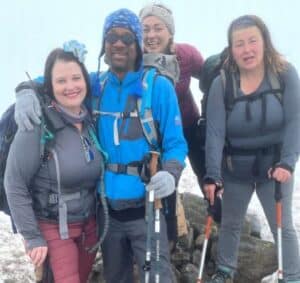
Becky also volunteers at the Neighborhood Clinic in Tacoma where she works with poor, homeless, and disadvantaged people. Prior to this, Becky started the Homeless Veterans Primary Care Team.“Homelessness is a deep, dark, black hole with no ladder. If you want out, you have to scale the walls. Lots of people give up.”
This strikes home for Becky. In high school, she was homeless herself. Her way out was the Navy. After serving from 1992-1997 she used the G.I. Bill to become a Registered Nurse, then paid her own way to become a Nurse Practitioner.
“I found a way out,” she says,”so I know it’s possible. I consider it a duty to help others find their way out too. I know what it’s like to be in that hole. And I know you can get out.”
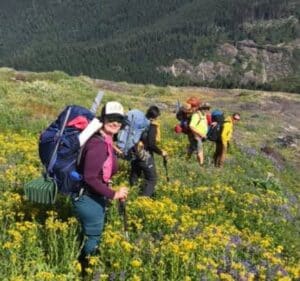 “Most people didn’t have cars and money to get to the V.A. so I went to them. I remembered what it was like to be on the streets. I asked myself where I would go and
“Most people didn’t have cars and money to get to the V.A. so I went to them. I remembered what it was like to be on the streets. I asked myself where I would go and
started looking. Sure enough, I found them there.”Becky offered medical assistance right on the street and helped people find housing and other benefits. “Homeless people always have multiple things going on. Almost always there is addiction. But also, mental illness, various forms of abuse… Some people think it is hopeless. I don’t. There’s always a way. I just take it one issue at a time.”
In all her work, Becky considers trust her most powerful asset.
“These people have heard lots of promises that were not kept. It is critical that I keep my word. I tell them I’ll be here every week at a certain time. I invite them to come see me and check-in. I tell them their situation won’t scare me off, that I’ve probably seen worse. I will be here. I will listen. Then it’s on me to follow through, every week, without fail.”
It works.
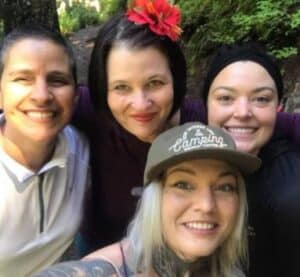
“People regularly say to me, ‘You’re the only person in this world I trust.’ That is exactly what I want to be. If there is one supportive, reliable person in your life, it’s a game-changer.”
“If I had a magic pill to fix addiction, I’d prescribe it. I don’t have one. I can give pills for blood pressure. Or diabetes. But I can’t cure addiction. That’s why mountaineering is important and why I volunteer with Recovery Beyond. It’s a tool. It helped me. It helps others. The exterior mountain is an exact parallel of the inner mountain. Climb one and you climb the other. It’s more than a metaphor. It’s a fact.”
“Being able to make it out of homelessness and to help others do the same—honest to God, I feel like the luckiest person alive. In fact, I know I am. I’m happy. I love living this life. I’m surrounded by great people. I wake up every day, look in the mirror, and like who I see. The rewards for my own mental health are outstanding. This is the best I’ve ever felt. By helping others, I get to feel normal. Man, it’s a great feeling. I want everyone to feel it too.”
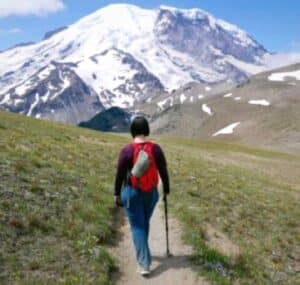
Story written by Maury Robertson
-
-
-
-
Author archive for Brooke Russell
Recovery Beyond > Articles by: Brooke Russell
